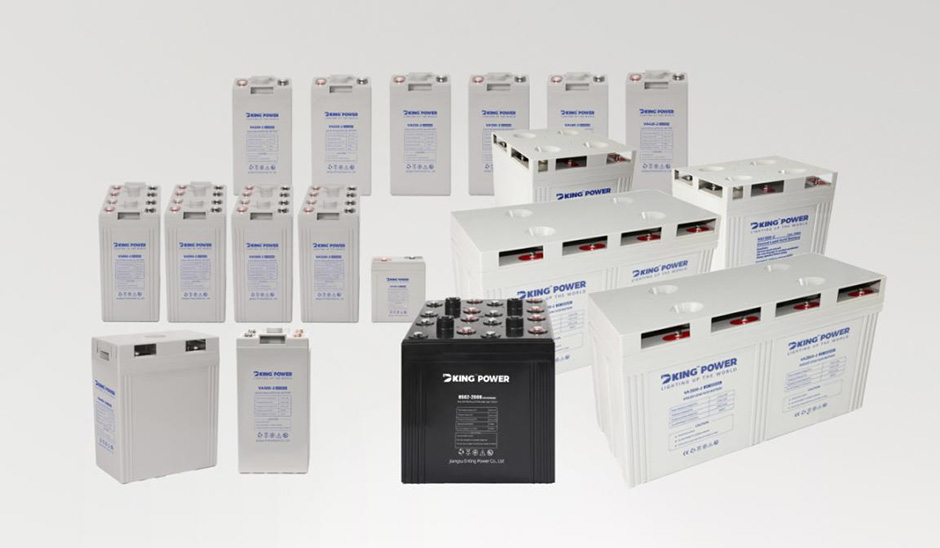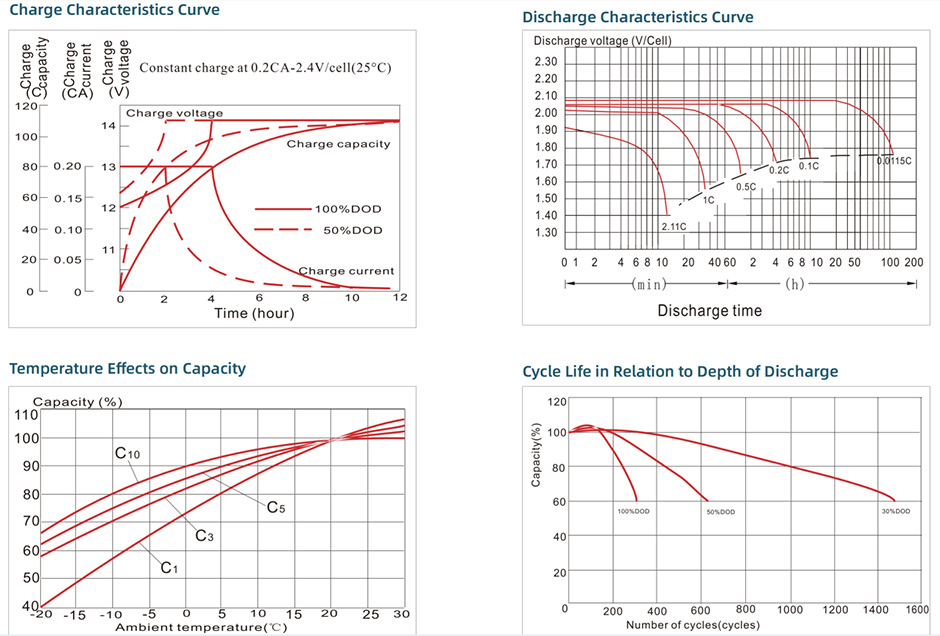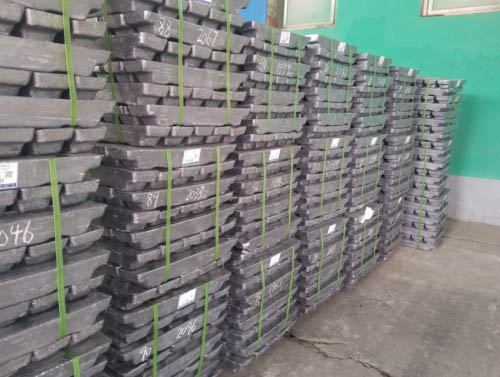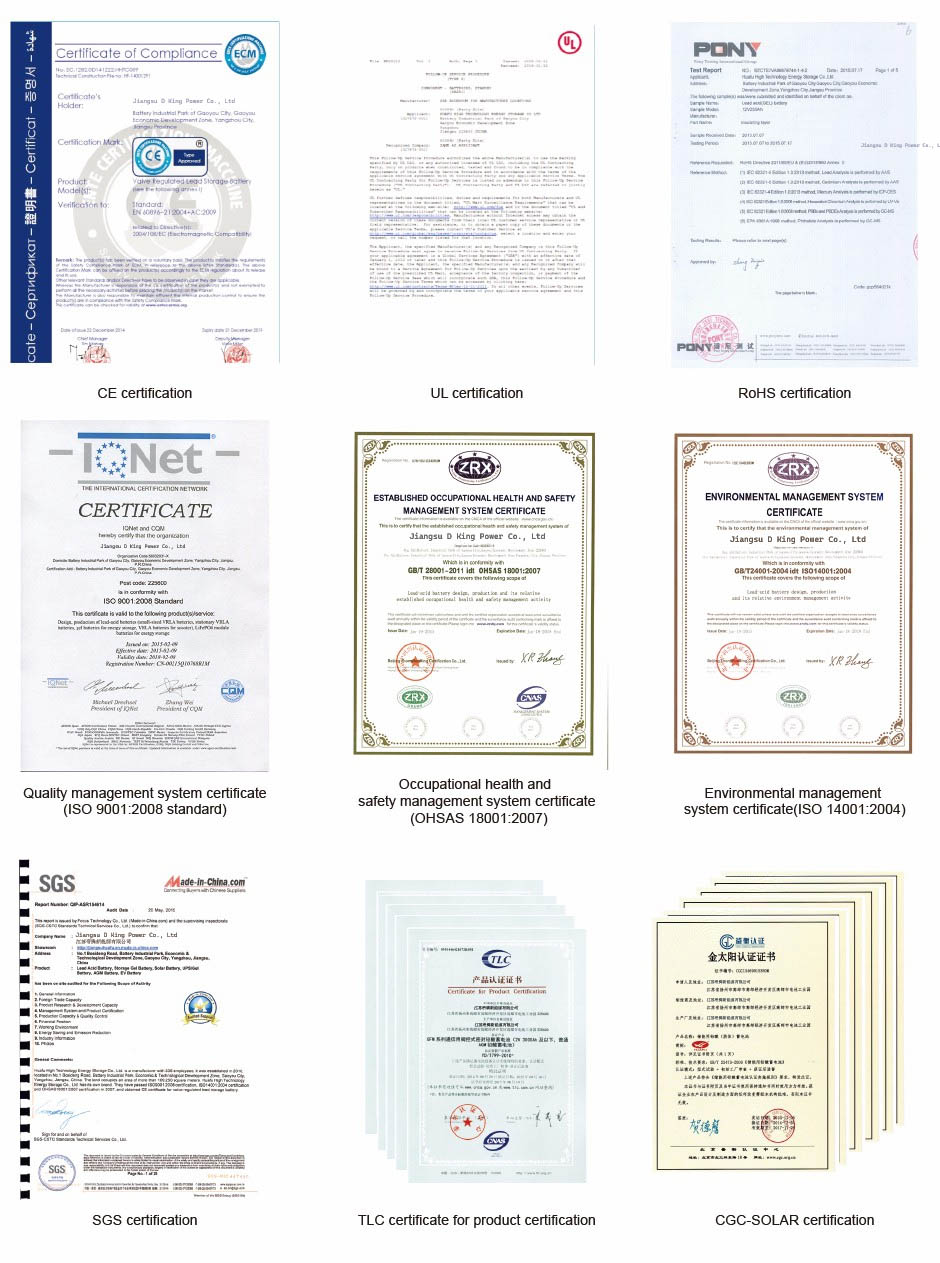DKGB2-600-2V600AH SEALED GEL LEAD ACID BATTERY
Technical Features
1. Charging efficiency: The usage of imported low resistance raw materials and advanced process help make theinternal resistance smaller and the acceptance ability of small current charging stronger.
2. High and low temperature tolerance: Wide temperature range (lead-acid:-25-50 C ,and gel:-35-60 C), suitablefor indoor and outdoor use in varies environments.
3. Long cycle-life: The design life of lead acid and gel series reach to more than 15 and 18 years respectively, forthe arid is corrosion- resistant. and electrolvte is without risk of stratification by using multiple rare-earth alloy ofindependent intellectual property rights, nanoscale fumed silica imported from Germany as base materials, andelectrolyte of nanometer colloid all by independent research and development.
4. Environment-friendly: Cadmium (Cd), which is poisonous and not easy to recycle, does not exist. Acid leakageof gel electrolvte will not happen. The battery operates in safety and environmental protection.
5. Recovery performance: The adoption of special alloys and lead paste formulations make a low self-dischargerate, good deep discharge tolerance, and strong recover capability.

Parameter
|
Model |
Voltage |
Capacity |
Weight |
Size |
|
DKGB2-100 |
2v |
100Ah |
5.3kg |
171*71*205*205mm |
|
DKGB2-200 |
2v |
200Ah |
12.7kg |
171*110*325*364mm |
|
DKGB2-220 |
2v |
220Ah |
13.6kg |
171*110*325*364mm |
|
DKGB2-250 |
2v |
250Ah |
16.6kg |
170*150*355*366mm |
|
DKGB2-300 |
2v |
300Ah |
18.1kg |
170*150*355*366mm |
|
DKGB2-400 |
2v |
400Ah |
25.8kg |
210*171*353*363mm |
|
DKGB2-420 |
2v |
420Ah |
26.5kg |
210*171*353*363mm |
|
DKGB2-450 |
2v |
450Ah |
27.9kg |
241*172*354*365mm |
|
DKGB2-500 |
2v |
500Ah |
29.8kg |
241*172*354*365mm |
|
DKGB2-600 |
2v |
600Ah |
36.2kg |
301*175*355*365mm |
|
DKGB2-800 |
2v |
800Ah |
50.8kg |
410*175*354*365mm |
|
DKGB2-900 |
2v |
900AH |
55.6kg |
474*175*351*365mm |
|
DKGB2-1000 |
2v |
1000Ah |
59.4kg |
474*175*351*365mm |
|
DKGB2-1200 |
2v |
1200Ah |
59.5kg |
474*175*351*365mm |
|
DKGB2-1500 |
2v |
1500Ah |
96.8kg |
400*350*348*382mm |
|
DKGB2-1600 |
2v |
1600Ah |
101.6kg |
400*350*348*382mm |
|
DKGB2-2000 |
2v |
2000Ah |
120.8kg |
490*350*345*382mm |
|
DKGB2-2500 |
2v |
2500Ah |
147kg |
710*350*345*382mm |
|
DKGB2-3000 |
2v |
3000Ah |
185kg |
710*350*345*382mm |

production process

Lead ingot raw materials
Polar plate process
Electrode welding
Assemble process
Sealing process
Filling process
Charging process
Storage and shipping
Certifications

More for reading
Off grid system energy storage battery
Function of energy storage battery
In the photovoltaic off grid system, the energy storage battery occupies the main part. Its main task is to store energy, ensure the stability of system power, and ensure the load power consumption at night or in rainy days.
Energy storage function: The photovoltaic power generation time and load power consumption time are not necessarily synchronized. The photovoltaic off grid system can generate power only when there is sunshine. The power generation power reaches the maximum at noon, but the power demand is not high at noon. Many off grid power stations for household use only use power at night. Therefore, the electricity generated during the day needs to be stored by the battery first, and then released after the peak power consumption.
Stable system power: photovoltaic power generation power and load power are not necessarily the same. Photovoltaic power generation is affected by radiation and is in a fluctuating state, and the load side is not very stable. The starting power is greater than the daily operation power of the load terminal. If the photovoltaic power generation terminal is directly connected to the load, it is easy to cause system instability and voltage fluctuation. The energy storage battery is now a power balancing device. When the photovoltaic power is greater than the load power, the controller sends the excess energy to the battery pack for storage. When the photovoltaic power cannot meet the load demand, the controller sends the electrical energy of the battery to the load.














